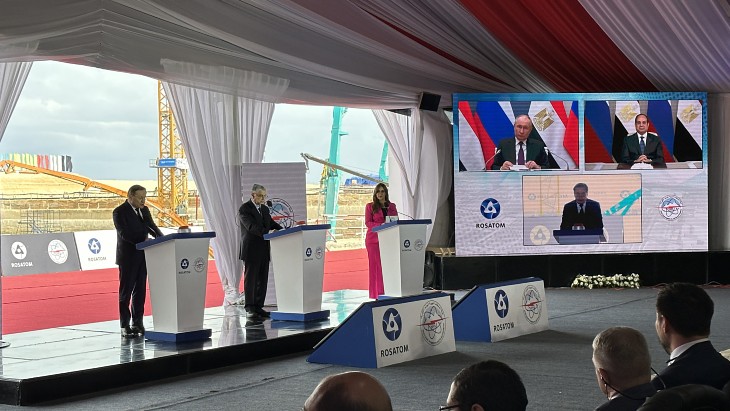El Dabaa will be Egypt's first nuclear power plant, and the first in Africa since South Africa's Koeberg was built nearly 40 years ago. The Rosatom-led project is about 320 kilometres north-west of Cairo and will comprise four VVER-1200 units, like those already in operation at the Leningrad and Novovoronezh nuclear power plants in Russia, and the Ostrovets nuclear power plant in Belarus.
The 2017 bilateral contracts stipulate that Rosatom will not only build the plant, but will also supply Russian nuclear fuel for its entire life cycle. It will also assist Egyptian partners in training personnel and plant maintenance for the first 10 years of its operation. Rosatom is also contracted to build a special storage facility and supply containers for storing used nuclear fuel.
Those attending the ceremony in person, or via videolink, included Egypt's President Abdul Fattah al-Sisi, Russian President Vladimir Putin, Egyptian Prime Minister Mostafa Madbouly, Rosatom Director General Alexey Likhachev, Egypt's Minister of Electricity and Renewable Energy Mohamed Shaker and the Chairman of the Egyptian Nuclear Power Plants Authority Amged El-Wakil. The presidents gave symbolic permission to pour the first concrete.
President Putin said it was "a flagship project in the best traditions of our bilateral cooperation ... Egypt is indeed our close friend and strategic partner. We interact on the principles of equality, mutual respect and consideration of each other’s interests".
President al-Sisi said it was a historic moment for "realising the dream of all Egyptians - to have nuclear power plants for peaceful purposes, emphasising the determination to move forward along the path of development, construction and shaping a bright future for Egypt". He said the project was progressing faster than the agreed schedule and said it added to "achievements of joint Egyptian-Russian cooperation throughout history".
He added that the current global energy supply crisis confirmed the importance of the nuclear power generation programme because it provided secure, carbon-free energy to help meet Egypt's electricity needs for its economic and social development plans.
The four units are being built concurrently, with work on the units starting at intervals of about six months - first concrete was poured for unit 3 in May 2023, for unit 2 in November 2022 and for the first unit in July 2022. Egypt's goal is for nuclear power to represent 9% of electricity by 2030, which would be achieved by the commercial operation of the first two units by that time, directly displacing oil and gas.
Likhachev said: "With the pouring of the first concrete into the foundation slab of power unit No 4, the largest cooperation project between our countries since the construction of the Aswan Dam is being launched at full capacity - the construction of the first Egyptian nuclear power plant. Now all four power units of the El Dabaa NPP are under construction. This means that our Egyptian site is becoming one of the two largest nuclear construction projects in the world."







_15863.jpg)







